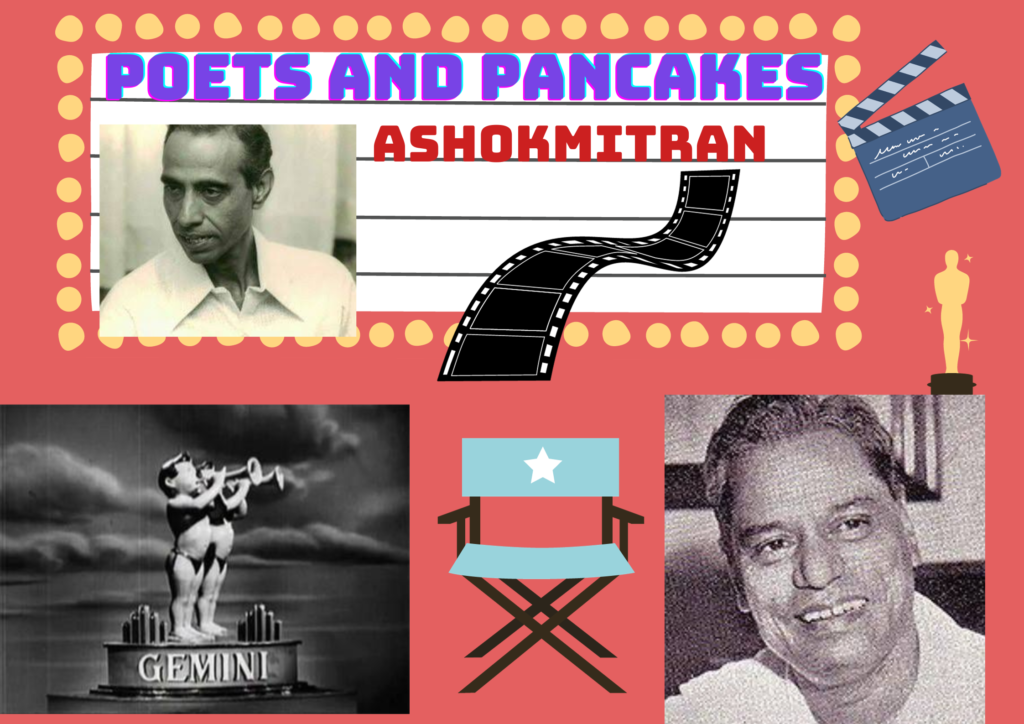Ashokmitran

TEXTUAL QUESTIONS.
Q1 What does the writer mean by ‘the fiery misery’ of those subjected to make-up?
Ans: The make-up room had incandescent lights at all angles around half a dozen mirrors. Thus the room sweltered due to the heat radiated from these lights. Those who were subjected to make-up had to endure this intense heat. In such dazzling lights and heat, they were trapped in fiery misery.
Q2. What is the example of national integration that the author refers to?
Ans: Gemini Studio’s make-up room was called an example of national integration by the author. The department had a Bengali, Maharashtrian, Kannadiga, Andhra, Madras Indian Christian, an Anglo-Burmese and many local Tamils as Chief make-up men and assistants, one after another.
Q3. What work did the ‘office boy’ do in the Gemini Studios? Why did he join the studios? Why was he disappointed?
Ans: The office boy had to put make-up on the crowd players when there was a crowd shooting. He joined the studios years ago in the hope of becoming a star actor or a top screenwriter, director or lyrics writer. He was disappointed that he could not realise his dream. He felt his talent was wasted in a department fit only for barbers and perverts.
Q4. Why did the author appear to be doing nothing at the studios?
Ans: The author was assigned the task of cutting newspaper clippings on a wide variety of subjects and filing them. However, most of the people in Gemini Studio thought he was doing nothing.
Q5. Why was the office boy frustrated? Who did he show his anger on?
Ans: The office boy felt that he had great talent to be a star actor, director or lyric writer but he was compelled to waste his talent in the make-up department. He held Kothamanagalam Subbu responsible for all his woes, ignominy and neglect.
Q6. Who was Subbu’s principal?
Ans: Mr. S. S. Vasan was Subbu’s principal. Subbu was very loyal to his boss and used his entire creativity to his principal’s advantage. Mr. S. S. Vasan himself acknowledged that film-making was so easy with a man like Subbu around.
Q7. Subbu is described as a man of many-sided genius. List four of his special abilities.
Ans: Subbu is described as a many-sided genius. He was an excellent actor and was tailor-made for films. He was always ready with a solution to every problem. He was very creative and a poet, capable of writing complex and higher forms of poetry. He was a novelist too. Above all, he was a kind and charitable man.
Q8. Why was the legal adviser referred to as the opposite by others?
Ans: A legal adviser is supposed to provide solutions to a company’s problems but the legal adviser of Gemini Studios was not a sharp and smart man. he created more problems than finding solutions. His thoughtless action ruined the brilliant career of an extremely talented actress.
Q9. What made the lawyer stand out from the others at Gemini Studios?
Ans: The lawyer was enrolled in the story department at Gemini Studios. All other members of the department wore khadi dhoti and long khadi shirts but the lawyer wore pants and a tie. He looked alone and helpless- a man of cold in the crowd of dreamers.
Q10. Did the people at Gemini Studios have any political affiliations?
Ans: Most of the members of Gemini Studios wore khadi and worshipped Gandhiji but beyond that, they had no affiliations to any political thought. They, however, had an aversion to communism.
Q11. Why was the Moral Rearmament Army welcomed at the Studios?
Ans: The Moral Rearmament Army was the counter-movement to international Communism. People at the Studios had an aversion to Communism, so they gave a warm welcome to MRA.
Q12. Name one example to show that Gemini Studios was influenced by the plays staged by MRA.
Ans: The MRA staged two plays, ‘Jotham Valley’ and ‘The Forgotten Factor’, in a most professional manner. The messages were simple but the costumes and sets of the plays were first-rate. For years, the Studio copied the scenes of sunrise and sunset.
Q13. What caused the lack of communication between the Englishman and the people at Gemini Studios?
Ans: The Englishman addressed the local Tamils in English – an unfamiliar language. Moreover, his native accent could not be understood even by the most literate members of the Studio.
Q14. Why is the Englishman’s visit referred to as an unexplained mystery?
Ans: The members of Gemini Studio were simple people who made Tamil films for common men, they did not have any taste for English Poetry. Moreover, the poet’s accent was beyond the comprehension of the members. Nobody could understand what he spoke about and what the purpose of his visit was.
Q15.Who was the English visitor to the Studios?
Ans: The English poet who visited Gemini Studios was Stephen Spender.
Q16. How did the author discover who the English visitor to the Studio was?
Ans: The English poet’s visit to Gemini Studio was a failure. Mr. Vasan, the boss also did not know much about the poet. It was after many years that the author discovered the identity of the visitor. The author wanted to send his entry into a short story contest organised by a British periodical ‘The Encounter’. He went to the British Council Library to get an idea about the periodical. When he read ‘Stephen Spender’- the name of the editor of the periodical, he recalled it as the Englishman who had visited the Gemini Studios.
Q17.What does ‘The god that failed’ refer to?
Ans: The book ‘The God that Failed’ contains six essays by six eminent writers, who were once attracted to Communism but were badly disappointed. They came out of it completely disillusioned. ‘The God’ stands for the principles and ideologies of Communism.
